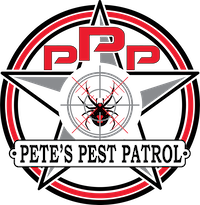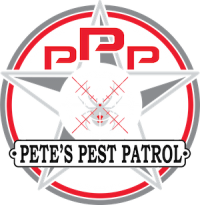Pest control is an important part of keeping homes and businesses safe, but it’s easy to overlook the environmental impact it has. Most people don’t understand how their pest control methods are affecting the environment and wildlife around them.
Keeping up with pest infestation can be a tricky balance – you want to get rid of potentially dangerous pests without harming other creatures or contributing to environmental harm.
Pete’s Pest Patrol is deeply committed to minimizing its environmental impact while providing effective pest control solutions. Our team understands that pest management should not come at the expense of the environment. We prioritize eco-friendly practices, using targeted, low-impact methods to control pests.
Pesticide Use and Environmental Impact
While effective against pests, pesticides can have unintended environmental consequences. At Pete’s Pest Patrol, we understand the importance of responsible pesticide use and its potential environmental impact.
- Unintended Harm: Indiscriminate pesticide application can harm non-target organisms, including beneficial insects, wildlife, and aquatic life. These unintended victims can suffer population declines or even extinction, disrupting ecosystems.
- Contamination Concerns: Pesticides can leach into the soil and runoff into water bodies, leading to water and soil contamination. This contamination can harm aquatic ecosystems, contaminate drinking water sources, and damage agricultural lands.
- Our Approach: We recognize the need for responsible pesticide application. Our experts are trained to use pesticides judiciously, employing targeted methods that minimize harm to non-target species and the environment.
Biodiversity Conservation
Biodiversity is essential for a healthy planet. Pete’s Pest Patrol takes pride in playing a role in preserving biodiversity through responsible pest management practices.
- Protecting Habitats: Invasive pests can disrupt local ecosystems by outcompeting native species and damaging their habitats. By managing invasive species, we help protect the delicate balance of local flora and fauna.
- Preventing Disruption: Invasive pests can lead to cascading ecological effects, altering entire ecosystems. Our pest control strategies prioritize preventing such disruptions.
Integrated Pest Management (IPM)
IPM is at the core of our eco-friendly pest control approach. It’s a holistic strategy that minimizes the environmental impact of pest control.
- Natural Alternatives: IPM encourages using natural alternatives, such as biological control, habitat modification, and mechanical pest removal, before resorting to chemical pesticides.
- Minimizing Chemical Use: We follow IPM principles to reduce the need for chemical pesticides. When we do use them, we choose the least toxic options and apply them sparingly.
Eco-Friendly Pest Control Solutions
There are plenty of eco-friendly pest control solutions available that not only effectively eliminate pests, but also minimize harm to the environment. Check out the following:
Natural Repellents
One of the best ways to keep pests at bay is by using natural repellents. These are substances that pests find unpleasant and will avoid at all costs. For instance, peppermint oil is a great natural repellent for ants, while eucalyptus oil can keep spiders out of your home.
Other examples of natural repellents include vinegar, garlic, and neem oil. These options not only repel pests but also have additional benefits. For instance, vinegar is a natural disinfectant and can be used to clean surfaces and keep pests away at the same time.
Maintain Cleanliness
Keeping your home or business clean is another important aspect of eco-friendly pest control. Pests are attracted to food sources and clutter, so by keeping things tidy and free of crumbs, you’ll be making your property less appealing to them.
Be sure to regularly clean and sweep floors, wipe down surfaces, and properly store food in airtight containers. This will not only prevent pests from entering your property but also improve the overall cleanliness of your space.
Beneficial Insects
When we think of pest control, our first thought may not be introducing more insects into the mix. However, there are many insects that can actually help control pest populations in a natural and eco-friendly way.
Ladybugs, for example, are great at controlling aphids which can damage plants. Other beneficial insects include praying mantises, lacewings, and parasitic wasps. These insects can be purchased from garden centers or online and released into your garden to keep pests under control.
Biological Control
Similar to beneficial insects, biological control involves using natural methods to control pest populations. This can include introducing predators or parasites that prey on specific pests.
For example, nematodes are microscopic worms that can be applied to soil and will target and kill grubs and other harmful insects. Birds are also natural predators of many common pests, so creating a bird-friendly environment in your yard can help keep pest populations in check.
Repellents and Traps
For those who prefer to take a more hands-on approach, there are many eco-friendly repellents and traps available on the market. These options use natural ingredients or non-toxic materials to effectively repel or trap pests without harming them or the environment.
Some common ingredients used in natural repellents include essential oils like peppermint, citronella, and eucalyptus. These scents are unpleasant to pests but safe for humans and animals.
Traps can also be made using household items such as a jar filled with soapy water to catch fruit flies or a mixture of sugar and vinegar to attract ants. These traps are not harmful and can be easily disposed of without causing harm to the environment.
Supporting Pollinators and Beneficial Insects
We recognize the vital role of pollinators and beneficial insects in maintaining healthy ecosystems. Our pest control practices support their conservation. We understand pollinators and beneficial insects’ vital role in maintaining healthy ecosystems.
At Pete’s Pest Patrol, we strike a balance between effective pest control and environmental protection. Our commitment to responsible pesticide use, biodiversity conservation, and sustainable pest management ensures that your property remains pest-free while respecting the natural world around us. We believe in coexisting with nature and preserving the delicate balance of our ecosystems.


